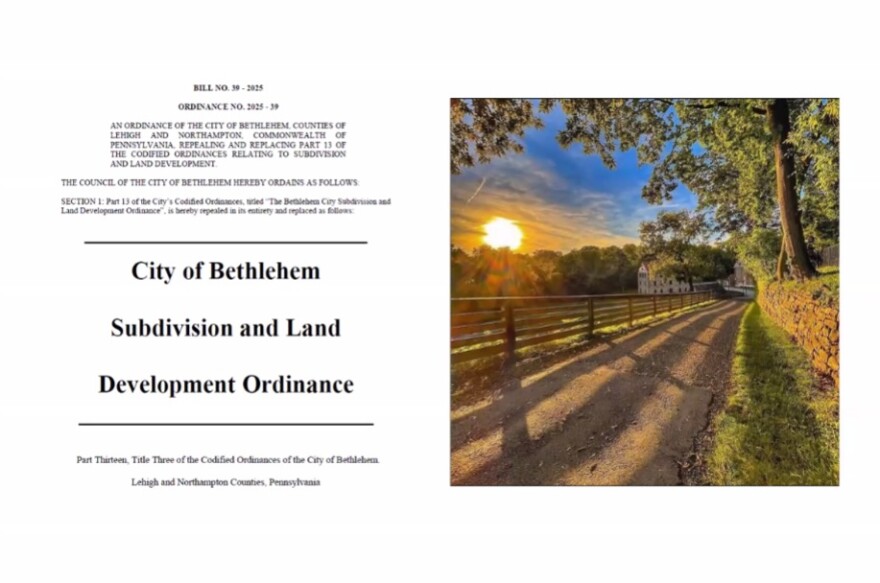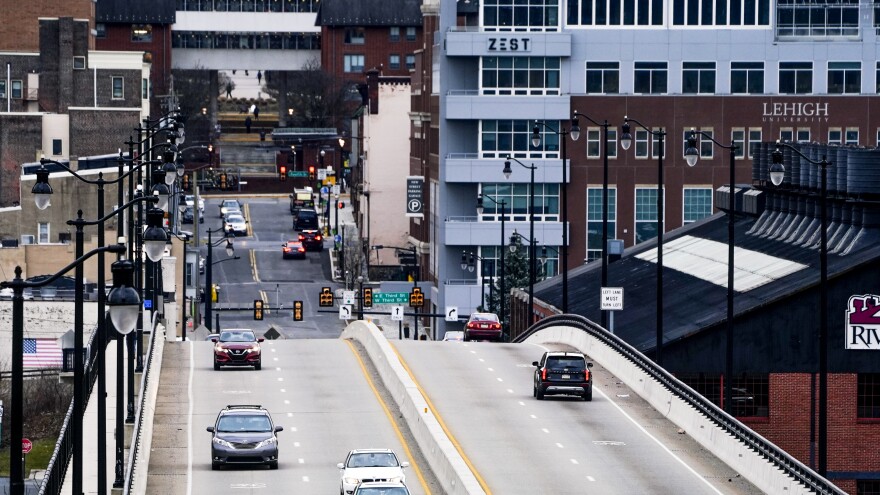BETHLEHEM, Pa. — There are five reasons — plus one — why the city recently updated its subdivision and land development ordinance, more commonly known as a SALDO.
“The previous SALDO was adopted in 1975 — a year after I was born,” Craig Pfeiffer, assistant director of planning and zoning, said.
“So that is why, one of the critical reasons — that's the plus one — as to why we really needed an updated SALDO.”
Pfeiffer gave a presentation on recent changes to the city’s SALDO Thursday evening, during the city Environmental Advisory Council’s monthly meeting.
In addition to modernizing the document, the new version incorporates the city’s Climate Action Plan goals and objectives; formally includes the EAC and Lehigh and Northampton Transportation Authority in the plan review process.
It also clarifies procedures for land development and subdivision submission, simplifies lot consolidation procedures and incorporates site layout and design standards.
City Council unanimously adopted the SALDO in early September.
“The old SALDO is no longer applicable unless the developers submitted their land development before we enacted the new SALDO — they have the benefit of using either the old or the new,” Pfeiffer said.
“But going forward, any new development has to follow this current ordinance.”

What’s in the new SALDO?
The new SALDO, in the works for four years, is a 102-page document that regulates how land is divided or improved within the city, aligning with the state Municipalities Planning Code.
Pfeiffer offered one caveat — the document includes “should” for some guidelines, and “shall” for others. While the former reads as a suggestion, the latter acts as a guideline.
“But we do encourage our development community to not only review this document, but review our review letters, [which] include a lot of this information and where that becomes applicable, where it gives us a little bit more teeth, is when we go to the Planning Commission.”Craig Pfeiffer, assistant director of planning and zoning
“It's difficult for us to require developers to do things,” Pfeiffer said. “It's obviously easier for us to do it when we're working within the public right-of-way.
“But we do encourage our development community to not only review this document, but review our review letters, [which] include a lot of this information and where that becomes applicable, where it gives us a little bit more teeth, is when we go to the Planning Commission.”
For his presentation, Pfeiffer focused on Article 134 of the document, which outlines design standards and required improvements, many of which deal with green infrastructure or alternative transportation.
For example, all new and widened roads and resurfaced roads now should be considered for bicycle traffic.
And if a building is more than 20,000 square feet, or has more than 20 dwellings, indoor bicycle parking is required.
There’s also a new section dedicated to green stormwater design.
“Rain gardens, bioswales, some other considerations, these should be installed and planted to promote infiltration and filtering pollutants where appropriate,” Pfeiffer said.
“Stormwater basins should be designed in a more naturalist manner with plantings that do not require weekly mowing or interior of the interior.”
In addition, the SALDO has guidelines for landscaping. For example, all tree species must be approved by the city forester, and existing healthy, mature trees should be preserved wherever practical.
While many of the guidelines in the new SALDO support the city’s Climate Action Plan, Pfeiffer said there is room for improvement.
Electric vehicle infrastructure, just like solar panels, are encouraged rather than required, which he noted is “frustrating.”
“Where we have been successful, we either get the developer to put in EV charging, or we get them to put in the infrastructure so that in the future, it could be hooked up,” Pfeiffer said.
“And that has happened in my tenure. So that's positive.”
Another CAP goal, to promote green roofs — a roof covered in vegetation — has been unsuccessful, he said, citing the expense.
Heritage trees
Also during the meeting, members unanimously voted to accept three nominations for the EAC’s heritage tree program.
A heritage tree program generally works to recognize trees due to their age, size or unique characteristics. While the EAC created the program in 2020, these are the first trees to be nominated.
“We received three nominations from Lehigh University,” Many Tolino, EAC member, said, She said members went on a site visit to assess them.
Lehigh’s forester recommended a persimmon tree, "because it is unique and a very old tree — the bark is very unique — and persimmon is also a fruiting tree, which is also unusual.”
The second tree nominated was an American beech, which Tolino described as “large and beautiful.”
“There were some concerns that there were initials carved into it, which we were kind of kicking back and forth whether or not that would be an issue,” she said.
“But to me, every time I see a beech anywhere where people are, there’s usually some initials carved into [it], so we didn’t think that would take away from the ability for it to be nominated.”
The third tree is a tulip poplar, which Tolino said is a “very old tree, native tree, really important for pollinators.”
With the nominations accepted, next steps include getting approval from City Council and creating plaques.
“These are our first trees,” EAC Chairwoman Lynn Rothman said. “This is very exciting.”


